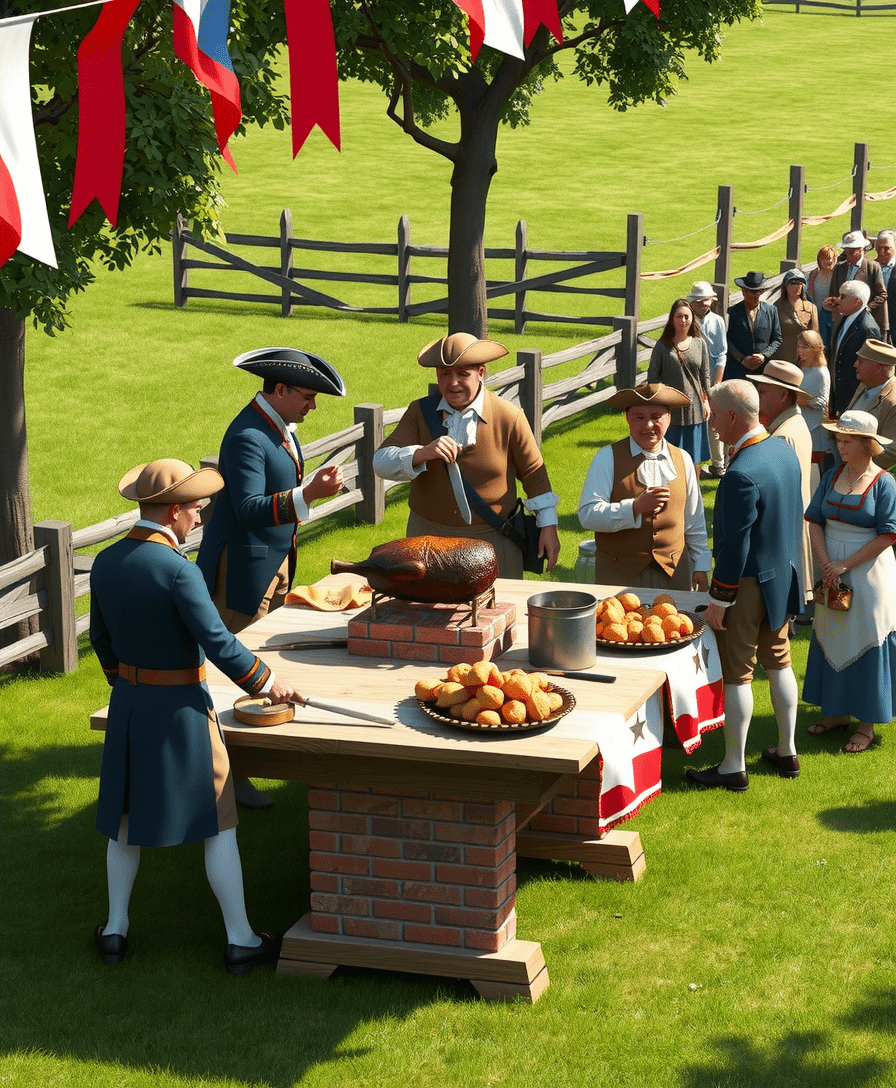
Politics and Barbecue: America’s 1776 Tradition
Share
History & Culture
From Pits to Politics: How Barbecue Became a Campaign Superpower
Long before campaign ads and social feeds, candidates won hearts and headlines with smoke, speeches, and shared plates. This is the story of how barbecue built crowds—and crowds built careers.

Before ballots, there were barbecues
In colonial America, massive outdoor barbecues were already part of civic life—multi-day gatherings tied to court days, market days, and local elections. George Washington’s diaries note attending several such “barbicues” in the 1769–1774 period, underscoring how normal these events were in Virginia public life. Food and drink weren’t just hospitality—they were persuasion. Candidates openly courted voters with free provisions; in 18th-century Virginia elections, plying voters was standard practice.
The Jacksonian era: barbecue goes national
The bond between barbecue and American politicking crystallized in the Jacksonian era. Andrew Jackson’s populist movement leaned into vast open-air rallies—bonfires, marching clubs, and pits. It was so recognizable that period cartoonists literally depicted The Political Barbecue, roasting Jackson (and later his rivals) over the fires of public opinion. By the 1830s, candidates were campaigning “at rallies, bonfires, and barbecues,” using food to draw crowds and then deliver stump speeches—an early template for the modern field event.
“In American politics, pits built crowds—and crowds made candidates.”
Reconstruction: food, freedom, and turnout
After the Civil War, community barbecues helped mobilize and educate newly enfranchised Black voters throughout the South. These gatherings functioned as civic classrooms and turnout engines, intertwined with the era’s broader political reorganization.
The 20th century: presidential smoke signals
In the television age, barbecue didn’t fade—it scaled. Lyndon B. Johnson turned Texas-style barbecues into high-profile campaign and diplomatic theater, teaming with famed pitmaster Walter Jetton. Coordinated “Johnson barbecues” popped up around the country—complete with press, protocol, and plenty of smoke.
Today: still a handshake-politics magnet
Even as tactics have evolved, the logic holds: smoke draws a crowd, and a crowd makes a stage. Modern campaigns still lean on barbecue fundraisers and community cookouts—spaces where a handshake, a plate, and a short speech can do more than a dozen ads.
Why barbecue works for politics
- Communal: One pit feeds many—scale lowers costs and raises turnout.
- Cultural: Barbecue is identity and ritual, not just food.
- Visual: Whole hogs and rib racks create organic media moments.
- Accessible: Open-air, affordable, welcoming—ideal for democratic rituals of listening and debate.
Our table, our stance
Barbecue and politics have always been intertwined—from campaign cookouts that rallied voters, to family tables where debates simmered alongside smoked ribs. That’s why at UCBBQ Sunday Dinner Magazine, we embrace both. Our mission isn’t just to share recipes, but to honor the history, culture, and conversations that barbecue has carried through generations. You can’t separate politics from barbecue, because barbecue has always set the stage for truth-telling, debate, and connection. Here, we don’t push bias—we shine a light on stories, facts, and traditions that matter. We welcome everyone to the table, because barbecue has always been more than food. It’s freedom, community, and history on a plate—and we’re here to keep telling those stories.
References & Further Reading
- Smithsonian Magazine — The Evolution of American Barbecue. Colonial roots through modern styles; notes on early public barbecues.
- Bitter Southerner (Jim Auchmutey) — Into Our Smoky Past. Washington’s diary mentions of barbecues; Jacksonian-era politicking.
- Library of Congress / Political Ephemera — “The Political Barbecue” (19th-century cartoons and prints depicting campaign barbecues).
- Southern Foodways Alliance — Pulled Pork Politics (essays on barbecue’s civic role and modern campaigning).
- Atlanta History Center — A Brief History of Barbecue. Regional traditions; public barbecues as community mobilizers.
- The New Yorker (1964) — “Barbecue” (coverage of LBJ-era political barbecues and pitmaster Walter Jetton).
Note: Specific images and cartoons of The Political Barbecue appear across museum catalogs and LoC collections; titles and call numbers vary by archive.
👉 Looking for more great recipes, BBQ tips, and real Sunday Dinner stories?
Explore UCBBQ Sunday Dinner